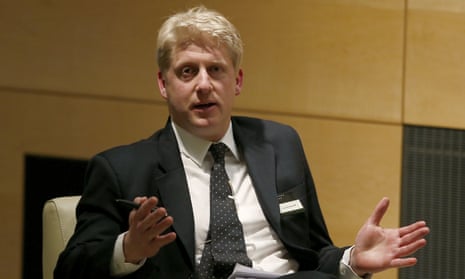Scientists in Britain are at risk of being excluded from major European research projects before ministers have even opened formal Brexit negotiations.
In a speech to scientists and business leaders on Thursday, science minister Jo Johnson said he had raised concerns over potential discrimination against UK scientists in pre-emptive talks with the EU science commissioner, Carlos Moedas.
The concerns centre on decisions to retain or appoint British researchers for European collaborations that are funded under the EU’s Horizon 2020 programme.
Johnson has asked his team at the Department of Business, Innovation and Skills to gather evidence of discrimination that may take place in the months ahead. He urged researchers and those in business to declare any instances where British researchers are sidelined.
“I have not been given a dossier of evidence that says it’s happening in concrete terms. There is a suggestion it might be anecdotally,” Johnson said after a speech at the Wellcome Trust in London in which he sought to reassure the UK science community about its future outside Europe. “If I see any specific evidence that it is happening I will bring it to the attention of the team in the department and they will make the relevant authorities and the commissioner aware of it.”
Johnson stressed that the UK remained a full member of the EU and that as such “there shouldn’t be any legal basis for discrimination” against British scientists.
But some in the technical industry believe discrimination has already begun. Andrew Graham, co-founder of OC Robotics in Bristol, said uncertainty over Britain’s future relationship with the bloc had made some European researchers cautious about collaborating with UK teams. “It’s natural risk aversion,” he said. “It’s human nature.”
Graham said he was aware of one EU consortium that had recently decided not to invite British organisations to join because it was unclear what deal the UK would strike with Europe.
“My concern is not with the commission, it’s with people putting proposals together today, and putting consortia together today, not being sure what will be what,” Graham said. “There is plenty of scope for consortia that would otherwise include British partners deciding not to do so.”
Graham is preparing a proposal with other EU partners for a funding round that closes in October. He said it was now unclear how the other partners would react to having a UK business in the collaboration. “Even by October we won’t necessarily have a clear idea of what the government is, or what their policies are, so we may miss the boat. It’s a real concern,” he said.
“What I’d encourage Jo Johnson to do is to clarify the position very quickly, at least with a statement of intent,” he added. ‘Even if the period of uncertainty is only a few months, there could be businesses, universities and research organisations adversely affected.”
Alfredo Sousa, a member of Carlos Moedas’ team, confirmed that Johnson had spoken to the commissioner on Thursday morning. Since Britain has not withdrawn from the EU, it continued to have full access to the Horizon 2020 programme, Sousa said.
Lucía Caudet, a spokesperson for the EU science office, said it was “far too early” to speculate on the future of EU research funding for the UK. “That will be addressed in due course, once negotiations with the UK begin on its withdrawal agreement as well as on the agreement concerning its future relationship with the EU. For the time being, nothing changes,” she said.
Speaking moments before his brother, Boris, withdrew his name from the Conservative party leadership contest, Jo Johnson sought to reassure scientists that the government would fight to ensure British research did not lose out in the future deal. “It’s obviously going to be important that the UK remains open to the brightest and best in the EU and around the world,” Johnson said. “We are going to remain an open, outward looking and confident country and science is going to be the forefront of the next stage of economic growth.”
“Now is the time to focus on the future, and with an optimistic mindset. We must look for the positives, while we deal with the challenges,” he added.
British universities receive about £1bn, amounting to 10% of their research funds, from the EU each year. In deciding to leave the EU, British science faced its greatest threat in living memory, Sir Paul Nurse, the former President of the Royal Society told reporters on Wednesday. “For science to thrive it must have access to the single market, and we do need free movement,” he said.
